In the heart of Osun State, Nigeria, students with disabilities face daily challenges that many might find unimaginable. While education is often touted as the great equalizer, the lived experiences of students like Oguntade Nafisat, Peter, and Blessing reveal a stark reality that underscores the urgent need for inclusive infrastructure and policies in Nigeria’s tertiary institutions.
Navigating the Campus: The Journey of Oguntade Nafisat
Oguntade Nafisat, an HND2 student of Accountancy at Federal Polytechnic, Ede, shares her struggles with navigating her campus due to her mobility impairment. During her ND1 days, her classes were held on the first floor of the department, and every day, she had to wait for someone to assist her and her wheelchair up the stairs. This daily ordeal often left her with severe backaches, a painful reminder of the barriers that students with disabilities face in accessing education.
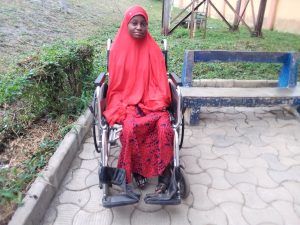
Nafisat’s challenges didn’t end in the classroom. Her hostel, with its many steps, poses a daily hurdle. She relies heavily on the kindness of others, particularly her roommates, who she praises for their unwavering support. However, as her classes have now moved to the South Campus, while her hostel remains on the North Campus, the challenges have only multiplied. The 4.3-kilometer distance between the two campuses’ main gates means she has to wait at the Ogberin main gate for buses or tricycles, adding another layer of difficulty to her already demanding day.
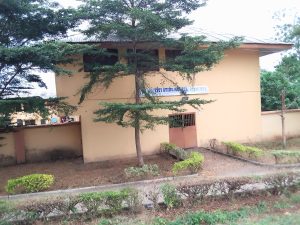
When asked if the school had made any accommodations for her, Nafisat’s response was disheartening. “I am the only one with this condition in Accountancy who goes to the South Campus,” she explained. Despite her efforts to seek assistance from her HOD when she learned about the relocation, she was told that she would have to manage, as there were only three days of lectures per week. This response highlights the pervasive lack of institutional support for students with disabilities, leaving them to “manage” in environments that are far from conducive to their needs.
The Global Perspective: Nigeria’s Commitment to SDG 4
Nafisat’s experience is not just a local issue; it reflects Nigeria’s broader challenges in meeting the United Nations Sustainable Development Goal 4 (SDG 4), which emphasizes inclusive and equitable quality education for all. As a signatory to the United Nations’ Sustainable Development Goals, Nigeria has pledged to eradicate discrimination in education by 2030. This includes eliminating gender disparities, ensuring equal access to all levels of education, and providing vocational training for vulnerable groups, including persons with disabilities.
SDG 4 also stresses the importance of creating inclusive and accessible educational facilities. However, as Nafisat’s story shows, the reality on the ground often falls short of these lofty goals. Experts warn that Nigeria’s inadequate investment in education is a significant barrier to achieving SDG 4 by 2030. Without significant improvements in infrastructure and policies, students with disabilities like Nafisat will continue to face unnecessary and unjust challenges in their pursuit of education.
Other Voices: The Struggles of Peter and Blessing
Nafisat’s story is echoed by other students with disabilities at Federal Polytechnic, Ede. Peter, an HND2 student of Computer Science, also faces significant challenges due to his mobility impairment. Like Nafisat, Peter’s department was recently relocated to the South Campus, adding a new set of difficulties to his daily routine. “Sometimes I take a Korope or Keke Napep to the South Campus,” he explained, referring to the small buses and tricycles that serve as public transport in the area.
Peter, who uses crutches to walk, has become accustomed to navigating stairs and other obstacles. His resilience is evident in his attitude: “I can fetch water by myself and clean my room,” he said, noting that his hostel experience is relatively easy, thanks to the support of his roommates and hostel cleaners.
Blessing, an HND1 student in the Department of Nutrition and Dietetics, shares a similar story. Her ND days were stressful, she explained, but now that she’s more familiar with the campus, she finds her HND days more manageable. Like Nafisat, Blessing uses a wheelchair, and her primary challenge is the rough road leading to her house.
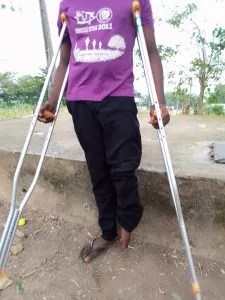
Blessing’s lectures are held at the Centre for Entrepreneurship Development building, conveniently located near the Ogberin main gate. However, accessing the building remains a challenge, as she often has to wait for someone to unlock the side door, which is easier for her to use than the main entrance. Despite these challenges, Blessing has found ways to cope, but her story highlights the gaps in the institution’s support for students with disabilities.
Institutional Response and the Need for Change
When approached for comment, the Public Relations Officer of Federal Polytechnic, Ede, deflected responsibility, suggesting that concerns about accessibility should be directed to the Osun state government or other relevant agencies. “There are always regulatory bodies monitoring our activities,” he said, implying that the institution is doing what it can within its limitations.
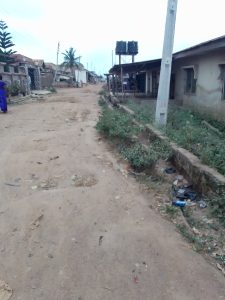
However, a closer look at the campus reveals significant accessibility issues. Many buildings are not designed to accommodate persons with disabilities, and there are no special learning aids available for these students. This lack of infrastructure and resources is a significant barrier to the full inclusion of students with disabilities in the educational process.
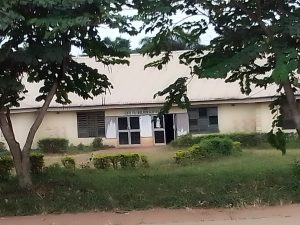
The Experience at Obafemi Awolowo University
The challenges faced by students with disabilities are not unique to Federal Polytechnic, Ede. At Obafemi Awolowo University (OAU), Samuel, a visually impaired student who also uses crutches, has learned to navigate the campus despite the many obstacles. “I have been facing it right from primary school,” he said, reflecting on the resilience he has built over the years.
However, Samuel’s challenges are compounded by the reckless behavior of bike riders on campus, who often disregard the safety of pedestrians. “I know how many times I have had to run with my crutches on the road just because a bike was coming,” he lamented.
Adewunmi Ebunoluwa, another OAU student with visual impairment, shared her struggles with limited access to resources like braille and digital texts. She also spoke about the social isolation she feels due to her disability, noting that there is a lack of understanding and support from her peers. “There is a lack of understanding about visual impairments and how to support students,” she said, highlighting the social barriers that exacerbate the challenges she faces.
OAU, despite being established over 50 years ago, has made some efforts towards inclusivity. Some buildings are equipped with ramps, allowing easier access for students with mobility impairments. However, the campus’s numerous staircases and steep walkways still pose significant challenges for students like Samuel and Adewunmi.
A Glimpse of Hope: University of Ilesa’s Inclusive Design
In contrast to the older institutions, the newly established University of Ilesa offers a glimmer of hope. Formerly Osun State College of Education, the institution was recognized as a university in September 2022. As a newer institution, many of its buildings are designed with accessibility in mind, adhering to laws that mandate public spaces to be accessible to persons with disabilities.
However, even at this institution, the journey towards full inclusivity is far from complete. When this reporter attempted to discuss the school’s efforts to promote inclusivity, the response was to write a letter to the school’s Registrar, outlining the concerns. As of the time of filing this report, no response had been received, leaving questions about the university’s commitment to inclusivity unanswered.
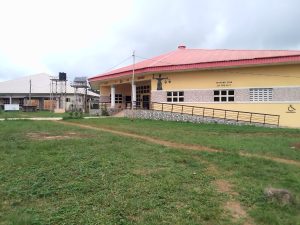
The Legal Framework: Disability Laws in Osun and Beyond
The struggles faced by students with disabilities in Osun State highlight the importance of strong legal frameworks to protect their rights. In 2024, the Osun State government passed the Prohibition of Discrimination Against Persons with Disabilities Bill into law, which aims to eliminate discrimination against PWDs in all areas of life, including education. The law mandates that public buildings and facilities must be accessible, with provisions for ramps, accessible restrooms, and other necessary accommodations.
The Osun State law mirrors the federal Discrimination Against Persons with Disabilities (Prohibition) Act of 2018, which also emphasizes accessibility and equal access to education. However, as the experiences of students like Nafisat, Peter, and Blessing show, there is a significant gap between the letter of the law and the reality on the ground.
Expert Opinion: The Urgent Need for Change
According to Mr. Yinka Olaito, Executive Director of the Centre for Disability and Inclusion Africa, the Disabilities Act 2018 made lack of accessibility to public buildings punishable by law starting in 2024. “Building codes stipulate that for any building with at least three storeys, there must be a lift or it must be constructed in a way that makes accessibility easy,” he explained. However, he noted that accessibility goes beyond ramps, as they only meet the needs of mobility-challenged persons. “A mandatory part of the DAPDA is the right of PWDs to education,” he added.
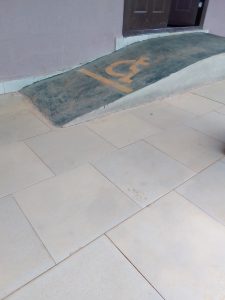
Mr. Yinka emphasized the importance of seeing accessibility as a mandatory requirement, not a mere convenience. He urged both public and private institutions to consider inclusion as a long-term, mutually beneficial issue that promotes equity and sustainable development.
A Call to Action
The stories of Nafisat, Peter, Blessing, Samuel, and Adewunmi paint a poignant picture of the struggles faced by students with disabilities in Osun’s tertiary institutions. While there have been some strides towards inclusivity, much more needs to be done to ensure that these students can access education on an equal footing with their peers.
As Nigeria strives to meet its commitments under the United Nations Sustainable Development Goals, it is crucial that the voices of students with disabilities are heard.
This story is supported by
Platform Times Investigative Journalism Foundation (PTIJF)

